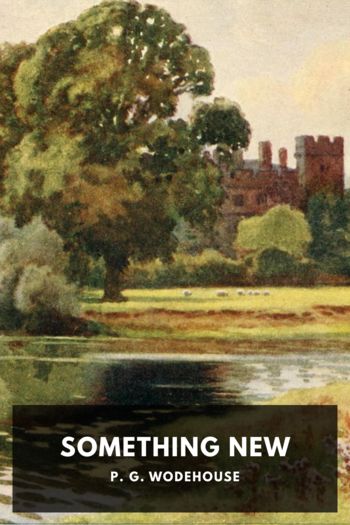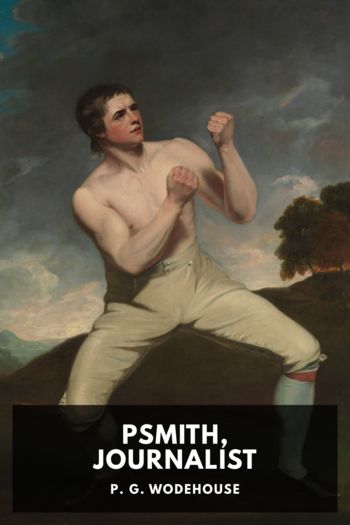Leave It to Psmith - P. G. Wodehouse (i wanna iguana read aloud .TXT) 📗

- Author: P. G. Wodehouse
Book online «Leave It to Psmith - P. G. Wodehouse (i wanna iguana read aloud .TXT) 📗». Author P. G. Wodehouse
“What a delightful old place,” she said as they drove off. “I almost wish I lived here.”
“During the brief period of my stay at the castle,” said Psmith, “the same thought has occurred to me. It is the sort of place where one feels that one could gladly settle down into a peaceful retirement and grow a honey-coloured beard.” He looked at her with solemn admiration. “Women are wonderful,” he said.
“And why, Mr. Bones, are women wonderful?” asked Eve.
“I was thinking at the moment of your appearance. You have just stepped off the train after a four-hour journey, and you are as fresh and blooming as—if I may coin a simile—a rose. How do you do it? When I arrived I was deep in alluvial deposits, and have only just managed to scrape them off.”
“When did you arrive?”
“On the evening of the day on which I met you.”
“But it’s so extraordinary. That you should be here, I mean. I was wondering if I should ever see you again.” Eve coloured a little, and went on rather hurriedly. “I mean, it seems so strange that we should always be meeting like this.”
“Fate, probably,” said Psmith. “I hope it isn’t going to spoil your visit?”
“Oh, no.”
“I could have done with a trifle more emphasis on the last word,” said Psmith gently. “Forgive me for criticising your methods of voice production, but surely you can see how much better it would have sounded spoken thus: ‘Oh, no!’ ”
Eve laughed.
“Very well, then,” she said. “Oh, no!”
“Much better,” said Psmith. “Much better.”
He began to see that it was going to be difficult to introduce a eulogy of the Hon. Freddie Threepwood into this conversation.
“I’m very glad you’re here,” said Eve, resuming the talk after a slight pause. “Because, as a matter of fact, I’m feeling just the least bit nervous.”
“Nervous? Why?”
“This is my first visit to a place of this size.” The car had turned in at the big stone gates, and they were bowling smoothly up the winding drive. Through an avenue of trees to the right the great bulk of the castle had just appeared, grey and imposing against the sky. The afternoon sun glittered on the lake beyond it. “Is everything very stately?”
“Not at all. We are very homely folk, we of Blandings Castle. We go about, simple and unaffected, dropping gracious words all over the place. Lord Emsworth didn’t overawe you, did he?”
“Oh, he’s a dear. And, of course, I know Freddie quite well.”
Psmith nodded. If she knew Freddie quite well, there was naturally no need to talk about him. He did not talk about him, therefore.
“Have you known Lord Emsworth long?” asked Eve.
“I met him for the first time the day I met you.”
“Good gracious!” Eve stared. “And he invited you to the castle?”
Psmith smoothed his waistcoat.
“Strange, I agree. One can only account for it, can one not, by supposing that I radiate some extraordinary attraction. Have you noticed it?”
“No!”
“No?” said Psmith, surprised. “Ah, well,” he went on tolerantly, “no doubt it will flash upon you quite unexpectedly sooner or later. Like a thunderbolt or something.”
“I think you’re terribly conceited.”
“Not at all,” said Psmith. “Conceited? No, no. Success has not spoiled me.”
“Have you had any success?”
“None whatever.” The car stopped. “We get down here,” said Psmith, opening the door.
“Here? Why?”
“Because, if we go up to the house, you will infallibly be pounced on and set to work by one Baxter—a delightful fellow, but a whale for toil. I propose to conduct you on a tour round the grounds, and then we will go for a row on the lake. You will enjoy that.”
“You seem to have mapped out my future for me.”
“I have,” said Psmith with emphasis, and in the monocled eye that met hers Eve detected so beaming a glance of esteem and admiration that she retreated warily into herself and endeavoured to be frigid.
“I’m afraid I haven’t time to wander about the grounds,” she said aloofly. “I must be going and seeing Mr. Baxter.”
“Baxter,” said Psmith, “is not one of the natural beauties of the place. Time enough to see him when you are compelled to … We are now in the southern pleasaunce or the west home-park or something. Note the refined way the deer are cropping the grass. All the ground on which we are now standing is of historic interest. Oliver Cromwell went through here in 1550. The record has since been lowered.”
“I haven’t time …”
“Leaving the pleasaunce on our left, we proceed to the northern messuage. The dandelions were imported from Egypt by the ninth Earl.”
“Well, anyhow,” said Eve mutinously, “I won’t come on the lake.”
“You will enjoy the lake,” said Psmith. “The newts are of the famous old Blandings strain. They were introduced, together with the water-beetles, in the reign of Queen Elizabeth. Lord Emsworth, of course, holds manorial rights over the mosquito-swatting.”
Eve was a girl of high and haughty spirit, and as such strongly resented being appropriated and having her movements directed by one who, in spite of his specious claims, was almost a stranger. But somehow she found her companion’s placid assumption of authority hard to resist. Almost meekly she accompanied him through meadow and shrubbery, over velvet lawns and past gleaming flowerbeds, and her indignation evaporated as her eyes absorbed the beauty of it all. She gave a little sigh. If Market Blandings had seemed a place in which one might dwell happily, Blandings Castle was a paradise.
“Before us now,” said Psmith, “lies the celebrated Yew Alley, so called from the yews which hem it in. Speaking in my capacity of guide to the estate, I may say that when we have turned this next corner you will see a most remarkable sight.”
And they did. Before them, as they passed in under the boughs of an aged tree lay a green vista, faintly dappled with stray shafts of sunshine. In the middle of this vista the Hon. Frederick Threepwood was embracing a young woman in the dress of





Comments (0)